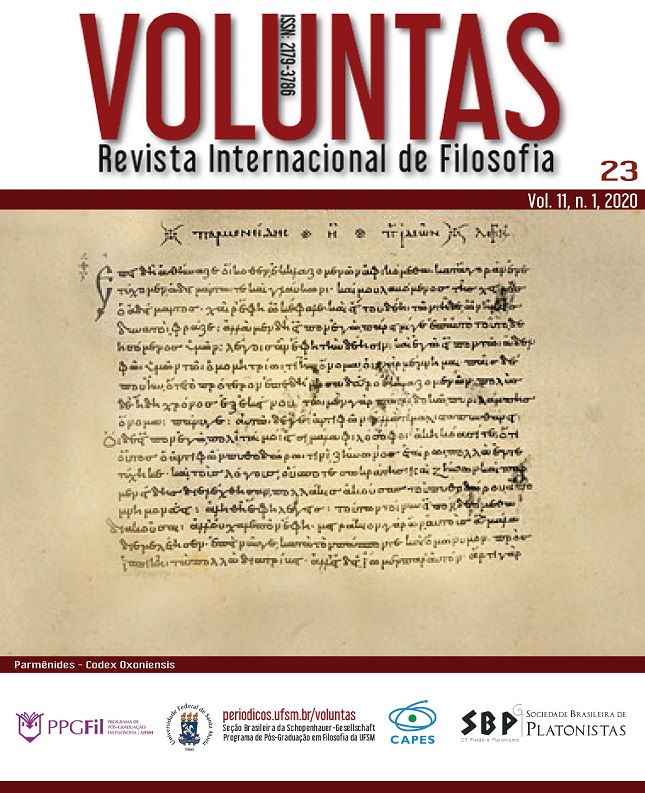A interpretação lógica do “Parmênides” de Platão no médio platonismo
DOI:
https://doi.org/10.5902/2179378643317Palavras-chave:
Parmênides, Médio platonismo, Proclo, Interpretação lógicaResumo
Neste artigo, mostrarei alguns argumentos que reforçam a ideia de que o Parmênides foi considerado um diálogo lógico durante o médio platonismo. Vou considerar o que alguns autores dizem, embora em diferentes épocas, sobre como o Parmênides de Platão foi lido. Meu objetivo é também mostrar que eles estiveram em um acordo geral: na verdade, dadas essas concordâncias, a probabilidade de que esta obra tenha sido classificada entre os diálogos lógicos se torna muito mais plausível. A principal fonte para estabelecer isso é representada por Proclo, que, em seu Comentário sobre o Parmênides de Platão, discute as tradições de interpretação relacionadas a este diálogo, propondo uma classificação na qual também está incluído o ‘modo lógico’. Com base na análise de algumas passagens do Didaskalikos de Alcino (cap. 6) e de algumas referências presentes na Vitae Philosophorum de Diógenes Laércio (III, 49), e com algumas indicações em Albino (Isagoge, III, 148, 19 e segs., VI, 151, 5-7), é possível supor com certo grau de verdade que o Parmênides, para alguns médios platonistas, em alguns aspectos, e mais geralmente para o médio platonismo, representava um ‘diálogo explicativo’ ou ‘diálogo expositivo’ (ὑφεγηματικός) que continha as indicações para aprender o método lógico, fornecendo ao mesmo tempo um exemplo de como se exercitar para aprendê-lo.
Downloads
Referências
ALCINOUS. The Handbook of Platonism. Translated with an Introduction and Commentary by John Dillon. Oxford: Clarendon Press, 1993.
ALEXANDER APHRODISIENSIS. In Aristotelis Topicorum libros octo commentaria. WALLIES, M. (ed.). Comm. in Arist. Graeca ii pars ii. Berlin, 1891.
AULUS GELLIUS. The Attic Nights. 3 vols, Translated by J. C. Rolf. Cambridge: Harvard University Press, 1989.
BALTES, M. & DÖRRIE, H. Der Platonismus in der Antike. II. Der hellenistische Rahmen des kaiserzeitlichen Platonismus. Bausteine 36-72: Text, Übersetzung, Kommentar. Stuttgart/Bad-Cannstatt: Frommann/Holzboog, 1990.
DIOGENES LAERTIUS. Lives of Eminent Philosophers, 2 vols, with an English translation by R. D. Hicks. London/New York: William Heinemann/G. B. Putnam’s sons, 1925.
GOURINAT, J.-B. La dialectique des hypothèses contraires dans le Parménide de Platon. In: FATTAL, M. (éd.). La philosophie de Platon. Paris: l’Hartmann, 2001.
LIDDELL, H.-G.; SCOTT, R. & JONES, H. S. (1940). A Greek–English Lexicon, 9th ed., with a Revised Supplement ed. by P.-G.-W. Glare, with the Assistance of A.-A. Thompson. Oxford: Clarendon Press, 1996.
LUNA, C. & SEGONDS, A.-Ph. [éds.]. Proclus. Commentaire sur le Parménide de Platon, t. I-V [8 vols], Paris: Les Belles Lettres, 2007-2013.
MANSFELD, J. Prolegomena. Questions to be Settled Before the Study of an Author, or a Text. Leiden/New York/Koeln: Brill, 1994.
NÜSSER, O. Albinus Prolog und die Dialogtheorie des Platonismus. Stuttgart: Teubner, 1991.
STEEL, C. Commentaire sur le Parménide de Platon. Traduction de Guillaume de Moerbeke, 2 vols. Leuven: Leuven University Press, 1982-1985.
STEEL, C. Proclus et l’interprétation ‘logique’ du Parménide. In: BENAKIS, L-G. (éd.). Néoplatonism et Philosophie Médiévale, Actes du Colloque international de Corfou 6-8 octobre 1995, Turnhout 1997.
STEEL, C. Une histoire de l’interprétation du Parménide de Platon dans l’antiquité. In: BARBANTI, M. & ROMANO, F. (a cura di). Il Parmenide di Platone e la sua tradizione. Atti del III Colloquio Internazionale del Centro di Ricerca sul Neoplatonismo. Catania: Cuecm, 2002, pp. 11-40.
STEEL, C. Procli In Platonis Parmenidem Commentaria, t. I-III, Oxford Classical Texts. Oxford/New York: Oxford University Press, 2007-2009.
TARRANT, H. Thrasyllan Platonism. Ithaca/London: Cornell University Press, 1993.
Downloads
Publicado
Como Citar
Edição
Seção
Licença
A submissão de originais para este periódico implica na transferência, pelos autores, dos direitos de publicação impressa e digital. Os direitos autorais para os artigos publicados são do autor, com direitos do periódico sobre a primeira publicação. Os autores somente poderão utilizar os mesmos resultados em outras publicações indicando claramente este periódico como o meio da publicação original.
A Voluntas é um periódico de acesso aberto sob a licença Creative Commons Atribuição-NãoComercial-CompartilhaIgual 4.0 Internacional (CC BY-NC-SA 4.0).






